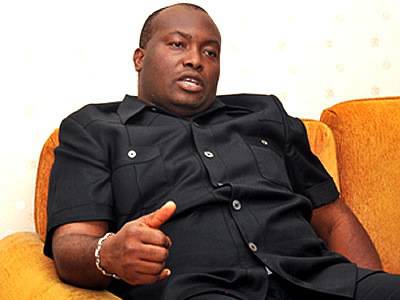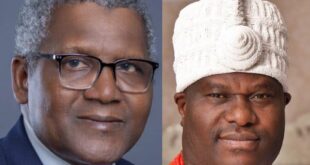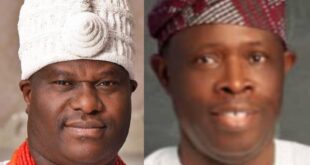In a written document obtained by SaharaReporters, a three-person panel of Nigeria’s Court of Appeal has explained why it reversed a decision by former Mohammed Bello Adoke and ex-chairman of the Economic and Financial Crimes Commission (EFCC), Ibrahim Lamorde, to exonerate Ifeanyi Ubah, Chairman of Capital Oil, of criminal liability in an oil subsidy fraud involving N46 billion. The alleged fraud took place in 2011.
On May 12, 2017, the appellate court issued a ruling that effectively invalidated the questionable exoneration of Mr. Ubah by Mr. Adoke and Mr. Lamorde. The court found it curious that the two well-placed government officials issued a series of legal opinions that sought to exonerate Capital Oil and Mr. Ubah of responsibility in the massive fraud.
In its ruling a month ago, the panel of appellate judges also reversed a controversial judgment handed down on July 25, 2013 by Justice Abdulkadir Abdu-Kafarati of the Federal High Court granting Mr. Ubah and his oil firm “a perpetual injunction” prohibiting the government from any future attempt to investigate or prosecute for their reported role in the oil subsidy scam.
The verdict of the Court of Appeal, written by Justice Emmanuel Agim, gave weight to the fact that current Attorney General, Abubakar Malami, and incumbent EFCC chairman, Ibrahim Magu, had refused to accept their respective predecessors’ decision to clear Mr. Ubah and Capital Oil.
Overruling the lower court, Justice Agim’s lead judgment concluded that there existed “a reasonable basis” to suspect that Mr. Ubah and his firm may have committed the fraud alleged by the Nigerian government. The appellate court also agreed with the argument of the government’s lead lawyer, Rotimi Jacobs, that it was odd for the AGF to accede to an arrangement whereby a perpetual injunction was issued against investigation and prosecution of any crime. According to Justice Agim, “the powers vested on the Attorney-General of the Federation cannot be exercised in such a manner as to prevent or prohibit investigation or further investigation of an allegation of the commission of a crime.”
The court also decided to set aside the verdict of the lower court that dismissed a report by a presidential panel led by Aigboje Aig-Imoukhuede that investigated subsidy payments to importers of petroleum products. In its interim report released November 3rd 2012, the presidential panel had found that Mr. Ubah and his firm received billions of naira in fraudulent oil subsidy claims.
The Court of Appeal remarked on the curious fact that Mr. Adoke and Mr. Lamorde wrote their various notes seeking to clear Mr. Ubah and Capital Oil between October 17, 2014 and February 25, 2015. At the time, the government had already filed and was pursuing an appeal against the ruling of Justice Abdulkadir Abdu-Kafarati of the Federal High Court. Mr. Adoke and Mr. Lamorde’s “exoneration” notes were submitted in court as Exhibits DU1, DU2, DU3, DU4 and DU5.
Court documents revealed that Mr. Adoke had on October 17, 2014
Issued a legal advice to the then EFCC chairman, Mr. Lamorde, exonerating Mr. Ubah and Capital Oil. In turn, Mr. Lamorde accepted the then AGF’s legal opinion via a letter dated February 25, 2015. Mr. Lamorde’s letter stated that “there is no criminal liability against” Mr. Ubah and Capital Oil.
In three subsequent letters to the Federal Ministry of Finance, the Debt Management Office and the Petroleum Products Pricing and Regulatory Agency, respectively, Mr. Adoke restated the exoneration of Mr. Ubah and his firm.
Justice Agim’s judgment noted that the vigorous pursuit of the appeal by the current AGF and EFCC chairman was an indication that the two officials were opposed to their predecessors’ opinions.
Mr. Ubah’s lead lawyer, Raphael Oluyede, had attached the “exoneration” letters by Mr. Adoke and Mr. Lamorde to buttress his client’s case that the appellate court should dismiss the appeal filed by the incumbent AGF and EFCC chairman. Mr. Oluyede urged the Court of Appeal to rule that the exoneration letters effectively invalidated the government’s appeal.
In rejecting that application, the Court of Appeal observed that the appeal against the verdict of the Federal High Court began on September 19th, 2013. The appellate court added: “It is curious that during the pendency of this appeal, an official of the office of the second appellant (the AGF) issued Exhibit DU1) on October 17, 2010. Yet, the same second appellant (the AGF) and the first appellant (EFCC) who accepted the advice have not withdrawn this appeal, are diligently pursuing the prosecution of the appeal and have mounted vigorous opposition to the first and second respondents’ (Ubah and Capital Oil’s) application to strike out this appeal on the basis of
Exhibits DU1, DU3, DU4 and DU5 issued by the second respondent (Adoke) and Exhibit DU2 issued by the first respondent (EFCC).”
According to Justice Agim, the diligent pursuit of the appeal indicated that the current AGF and EFCC chairman “have refused to ratify or adopt the letters written by their predecessors.”
Justice Agim’s verdict noted that the appellate court disregarded the documents prepared by Mr. Adoke and Mr. Lamorde since Mr. Ubah and Capital Oil did not apply for permission of the court to introduce the documents for the first time at the Court of Appeal, remarking that the controversial documents were never part of the case at the trial court.
According to Justice Agim, “the liberty to raise a fresh issue of jurisdiction without leave does not carry with it the liberty to adduce fresh evidence on which it is to be founded without leave of court.”

 Startrend International Magazine For Your Latest News And Entertainment Gists
Startrend International Magazine For Your Latest News And Entertainment Gists




